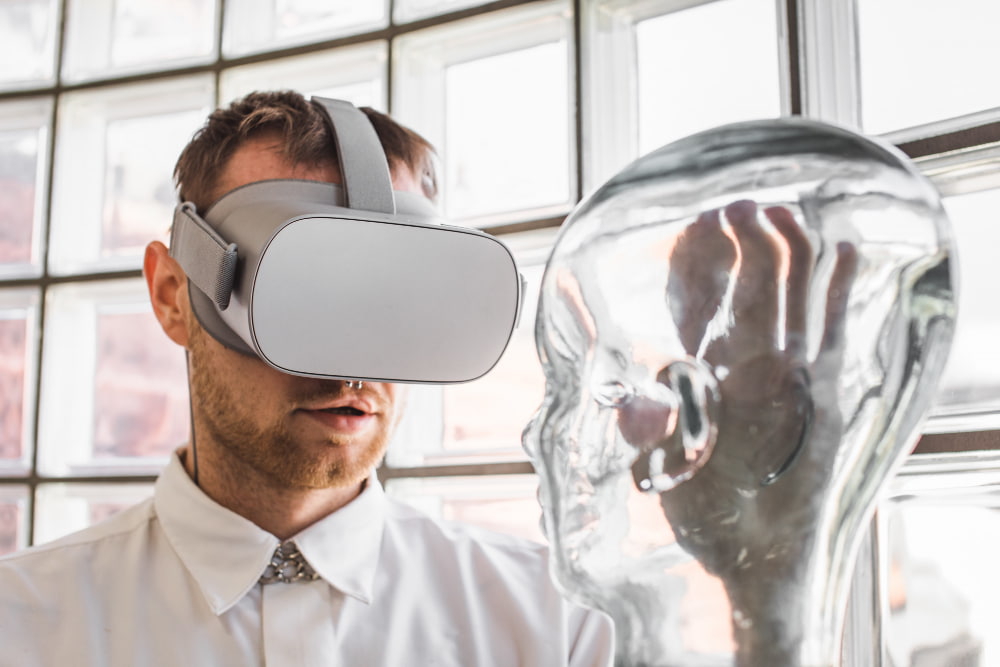How the Professional Services Sector is Driving Transformation with VR
Table of Contents:
Key Points
- Virtual Reality (VR) is transforming the professional services sector by enhancing soft skills and client management capabilities.
- VR training allows professionals to practice difficult client interactions in realistic scenarios, leading to improved confidence and client satisfaction.
- The implementation of VR in onboarding and compliance training helps firms maintain regulatory standards while fostering a strong organizational culture.
The professional services sector, encompassing consulting, financial services, law firms, and specialized agencies, is undergoing change, and Virtual Reality is emerging as a tool for developing soft skills and enhancing client management capabilities. For professional services leaders, the challenge is clear: deliver exceptional client outcomes while developing talent rapidly and controlling costs. VR training addresses all these imperatives simultaneously.
The Professional Services Challenge
Professional services success depends heavily on judgment, communication, emotional intelligence, and the ability to navigate ambiguous, high-pressure client situations. Unlike manufacturing, where procedures are standardized, professional services require the development of nuanced interpersonal competencies that traditional training struggles to build effectively.
Classroom instruction conveys frameworks but cannot replicate the emotional pressure of difficult client conversations. Role-playing with colleagues lacks authenticity. VR solves this by creating realistic, emotionally engaging scenarios where professionals practice difficult conversations and receive immediate feedback.
Application 1: Client Interaction and Relationship Management
For consulting and advisory firms, the ability to build client trust and navigate challenging conversations separates mediocre performers from revenue generators. VR provides an ideal environment for developing these critical soft skills through repeated practice with realistic client avatars that respond dynamically to trainee behavior.
Bank of America deployed VR across thousands of financial centers, enabling employees to practice customer interactions in immersive environments. Post-implementation, the bank reported significant improvements in employee confidence and customer satisfaction scores. PwC research found participants scored higher on communication assessments after VR training. VR learners were 275% more confident applying skills to real client situations compared to classroom counterparts.
Explore VR’s impact on soft skills training
Application 2: Financial Services Training
Banking and financial services have emerged as the most active adopters of VR training, driven by the need for compliance, technical accuracy, and superior client service. VR addresses multiple training needs simultaneously: onboarding advisors, maintaining regulatory compliance, practicing fraud detection, and developing consultative selling skills.
For fraud detection training, cash handlers and tellers need to recognize fraudulent transactions safely. VR provides realistic simulations where trainees learn to detect fraud indicators without risking actual financial loss. For wealth management roles, VR enables the practice of consultative conversations, where advisors explain complex products and build relationships, utilizing nuanced skills that are difficult to develop through traditional training.
Bank tellers and financial advisors must navigate emotionally charged situations, such as angry customers disputing fees or suspicious transactions. VR replicates these high-pressure scenarios authentically, allowing employees to develop appropriate responses through repeated practice.
Discover immersive training applications in banking.
Application 3: Sales Training and Pitch Development
Professional services selling requires blending technical knowledge, emotional intelligence, and persuasive communication; competencies VR develops more effectively than traditional methods. VR sales training immerses learners in realistic scenarios where they practice the entire sales process: prospecting, needs discovery, presentations, objection handling, and closing.
United Rentals uses VR to train outside sales representatives on operating effectively in chaotic construction environments. VR simulations drop trainees into realistic job sites with machinery noise and hazards, building skills to maintain client focus under real-world conditions. VR-trained sales representatives complete training four times faster than their classroom counterparts with significantly higher confidence.
For complex B2B sales, VR enables the practice of multi-stakeholder scenarios. Trainees experience presenting to virtual boardrooms where different stakeholders have competing priorities, practicing to address concerns from financial and operational decision-makers.
Learn how VR transforms sales training effectiveness
Application 4: Onboarding and Cultural Immersion
For professional services firms where culture and values differentiate the brand, effective onboarding lays the foundation for long-term success. VR enables new hires to experience firm culture immersively, understand service delivery methodologies, meet key team members, and practice core competencies before serving their first client.
Traditional onboarding, which involves weeks of presentations and shadowing, is time-consuming and inconsistent. VR transforms onboarding into an experiential journey, where new consultants take virtual office tours, meet leadership, and experience scenarios that demonstrate the firm’s client service approach. This immersive introduction creates emotional connections to organizational culture far more effectively than reading employee handbooks.
Application 5: Compliance and Risk Management
Professional services firms operate under stringent regulatory frameworks, where compliance failures carry severe consequences, including fines, legal liability, and reputational damage. VR training ensures that staff understand and consistently follow compliance protocols.
Financial institutions face complex requirements across anti-money laundering, know-your-customer, data privacy, and fiduciary duty regulations. VR simulations present realistic scenarios where advisors must recognize compliance red flags and follow proper procedures under pressure. Intel’s electrical safety VR program achieved 300% five-year ROI.
Implementation Strategy
Prioritize soft skills and client-facing competencies where VR delivers maximum advantage. Start with high-impact, repeatable scenarios trainees encounter frequently. Leverage no-code platforms enabling rapid iteration as client needs evolve. Measure business impact, client satisfaction, deal close rates, and project success, not just training metrics.
Conclusion
Professional services firms compete on the quality and capabilities of their people. VR training represents one of the most powerful tools available for developing critical human capabilities on a large scale. Organizations that implement VR report higher employee confidence, better client outcomes, and improved talent retention.
Ready to transform your professional services firm? Connect with Mazer’s experts for customized VR solutions addressing your specific engagement and skill development challenges.
Sources
“Bank of America is First in Industry to Launch Virtual Reality Training Program for Employees in Financial Centers.” Bank of America Newsroom, 20 Oct. 2021, newsroom.bankofamerica.com/content/newsroom/press-releases/2021/10/bank-of-america-is-first-in-industry-to-launch-virtual-reality-t.html.
“PwC’s US VR study: The effectiveness of virtual reality soft skills training.” PwC, 2022, https://www.pwc.com.au/digitalpulse/upskilling-training-vr-metaverse.html.
“United Rentals builds sales team confidence with Immersive Learning.” Strivr, 2024, www.strivr.com/customers/united-rentals/.
“Using Virtual Reality as an Effective Corporate Training Tool.” Dedicated Computing, 2020, info.dedicatedcomputing.com/hubfs/Intel/virtual-reality-corporate-training-solution-white-paper.pdf.
What sectors are adopting Virtual Reality for training?
How does VR training improve client interaction skills?
VR provides an ideal environment for developing critical soft skills through repeated practice with realistic client avatars that respond dynamically to trainee behavior.
What benefits did Bank of America report after implementing VR training?
Post-implementation, Bank of America reported significant improvements in employee confidence and customer satisfaction scores.
How does VR training compare to traditional training methods?
VR-trained sales representatives complete training four times faster than their classroom counterparts and exhibit significantly higher confidence in applying their skills.

Author: Rafał Siejca
Rafal has over twenty years of corporate experience, including roles at Millennium Bank, Comarch, and leading software teams at PZU, one of Europe’s largest insurance companies. As one of Poland’s few true VR experts with a decade of experience, he ensures timely, high-quality project delivery as CEO and CTO.










